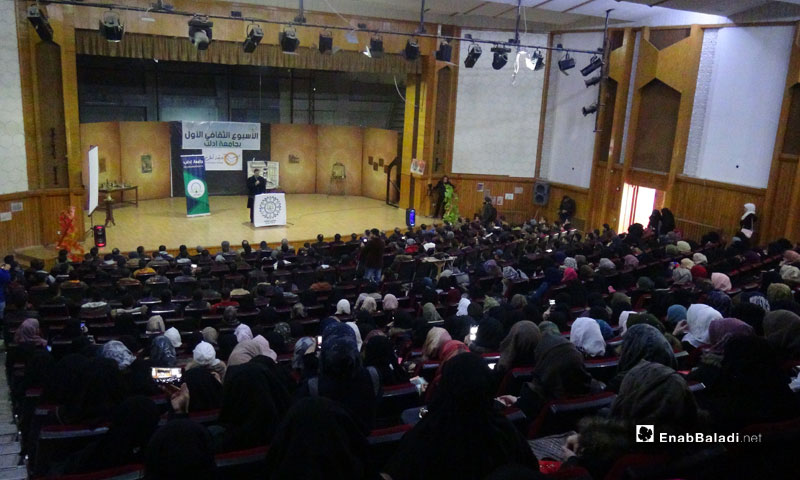The Cultural Center of the Idlib University held a cultural event, for a week and under the title the “First Cultural Week,” in Idlib governorate.
The event included several activities, from 26 to 30 of November, where plays, seminars, poetry contests and other similar activities were presented.
The importance of this event arises from its being a discussion-based meeting, bringing together the deans and directors of the University and students from the different departments and specialties, as Abu Baker Satouf, events official at the Idlib Cultural Center, told Enab Baladi.
H added that former events at the Idlib University were limited to honoring the distinct students, while the university has never witnessed similar cultural activities before.
In addition to above-mentioned activities, the Week’s program included a two-day-visit to the Cultural Center, in addition to a one-day-visit to the city’s museum, which aimed at introducing the students to the most prominent antiquities and ruins hosted by the museum.
Female Students’ Clothes Trigger Controversy
The cultural event was a witness to a controversial incident, triggered by female students prevented from attending the Cultural Week because of their clothes, described as “offence against public morals,” by the “Hisbah” (accountability) Apparatus’ members, who stood at the gate of the University.
A female student at the University, on the condition of anonymity, told Enab Baladi, that she was prevented from entering the Cultural Center because of her clothes, pointing out that she wore hijab and loose outfit.
She added that upon asking them about the reason, the “Hisbah” Official told her that she already has three warnings, thus, she is denied entry.
When she questioned the warnings, he refused to talk to her. However, after an altercation, during which their voices went louder, he informed her that she is not allowed entry to the Cultural Center because she is wearing a red outfit, while she had burgundy colored clothes on.
The female student pointed out that other female students beside herself were prevented from entering the Cultural Center, for the “Hisbah” officials refused to allow them in despite one of the University professor’s intervention.
After a dispute, the students were made to sign a pledge, which commits them to wearing the “Sharia” dress, of dark colors specifically.
The city of Idlib is suffering from the restrictions imposed on the women dress code, practiced by an apparatus called the “Women Dawah Office,” Hisbah, assigned the mission of monitoring women’s commitment to wearing the ordained dress, thus applying the “al-Fatah Army’s” (Army of Conquest) new decree, issued late in November 2015, which prevents women from wearing “makeup” and leaving their houses without it the “sharia” dress, defined by the Army, which stressed that it be flowing and that the abaya or jilbab (a long loose garment for women) should not be short, colored or decorated.
The Hisbah apparatus sends patrols of women preachers to streets, markets and universities, under the “Promotion of Virtue and Prevention of Vice” slogan.
In case a woman is found wearing a dress that violates the “sharia” outfit, the preachers give her a warning, which sometimes might reach the point of a prison penalty, called “disciplinary” imprisonment, during which the woman get lectured, receiving religious advice, and writes a pledge document of non-repetition.











